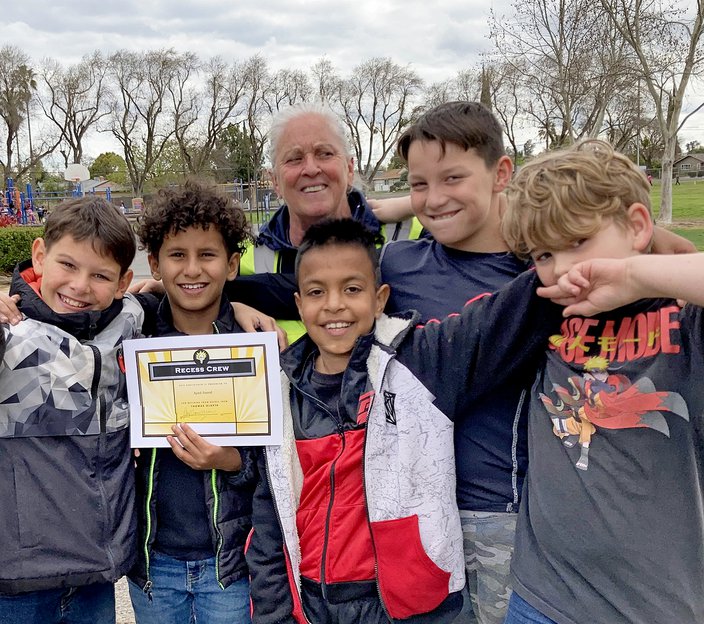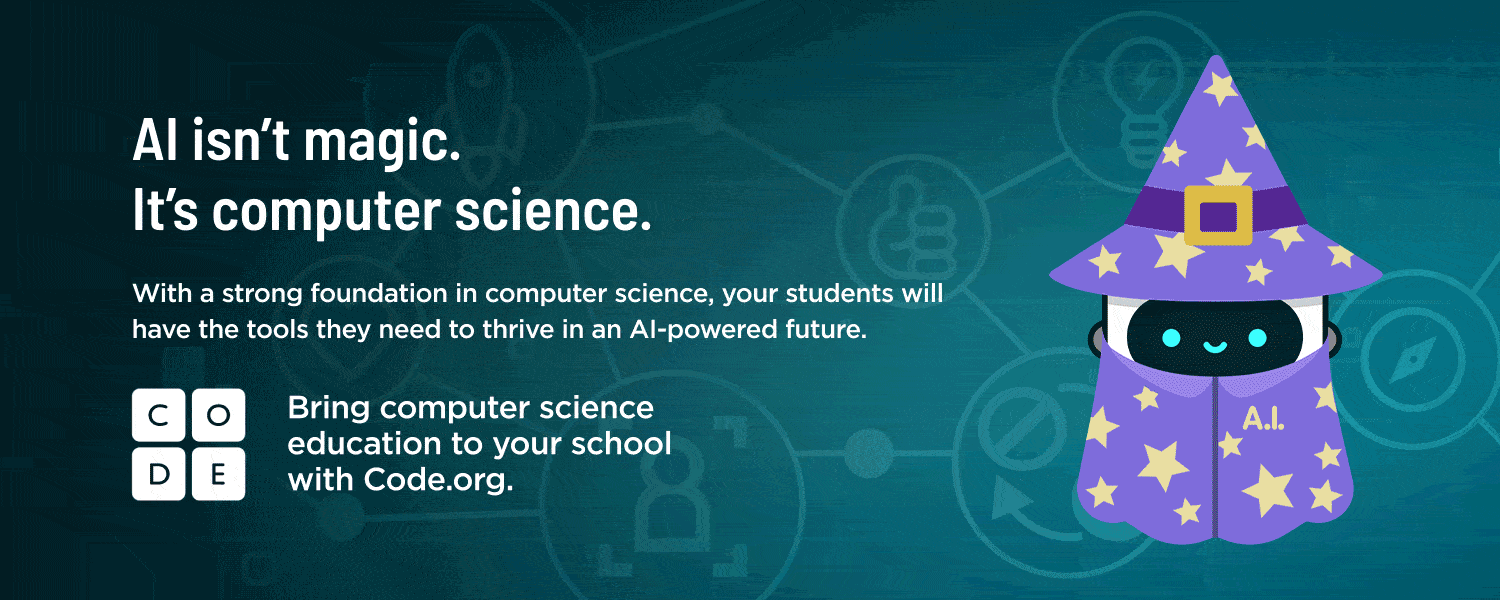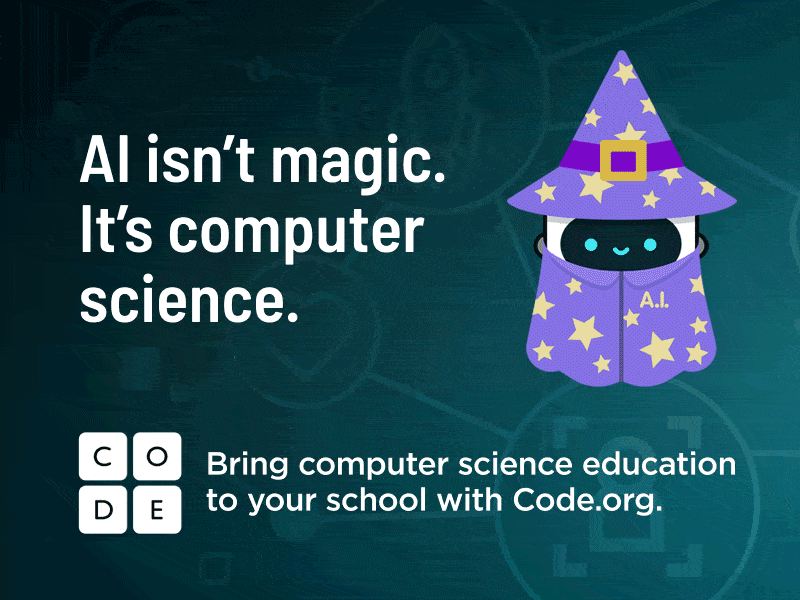
Ms. Joy, center, is director of the Recess Crew at Thomas Olaeta Elementary School. The program teaches soft skills to students during supervised, structured play at recess.
Meet the Recess Crew
Program offers support to students who need soft skills development
May 1, 2023
The following article was written by Steve Kuykendall, principal at Thomas Olaeta Elementary School, and Jennifer Rotondaro, Board Certified Behavior Analyst with Atwater Elementary School District.
As research has demonstrated, the pandemic and the rise in social media use have had a negative impact on the social-emotional development of children. It is more evident now than ever that children need social-emotional support and assistance in developing their “soft skills.”
The Oxford Languages English dictionary defines soft skills as “personal attributes that enable someone to interact effectively and harmoniously with other people.” As elementary educators, we have seen a spike in the number of students who need more support since the return to school from online learning. In spite of providing classroom social skills lessons, classroom community building activities and classroom social circles, there is a subpopulation of children that are unable to generalize social skills lessons learned in the classroom to the playground.
Research demonstrates that a lack of developing soft skills has lifelong negative effects. A 20-year study published by the American Public Health Association in 2015, “Early Social-Emotional Functioning and Public Health: The Relationship Between Kindergarten Social Competence and Future Wellness,” tracked 735 kindergarten students in the U.S. This study found that “... students who exhibited weaker social competency skills were more likely to drop out of high school, abuse drugs and alcohol, and need greater government assistance.”
So, what do we do to help these students build social competence/soft skills? In Atwater Elementary School District, we developed a program that provides organized, supervised, structured play for children who struggle on the playground with real-time constructive feedback. This program is known as Recess Crew (RC). These children who struggle on the playground with emotional dysregulation, physical or verbal aggression, or even self-isolation, are identified and put on an Intervention Behavior Plan (IBP). A school staff member and the student work together to identify the behaviors the student is struggling with and set behavioral goals for the student. The student is then assigned to RC and starts the program.
In RC, we work to promote a growth mindset and help students realize the importance of “yet” — the idea that you are not there yet, but you will be. For these reasons, the program utilizes the language of the theater: “practice” because we know it takes practice to improve; “performance” to demonstrate the learned skill; and “retirement” when it’s time to move on to a new adventure.
The first step to start RC is to identify your RC “director.” In our case, that is Ms. Joy, a campus supervisor. It is essential to find the right person for this job. For RC, we recommend someone who is loving, compassionate, strong and resilient to work with your students. You cannot give away what you do not have yourself, so again, we reiterate that you need to find your Ms. Joy.
Phase 1: Practice
After completing their IBP, students are introduced to the RC director, who reviews their IBP with them and starts a student progress log. The director explains the expectations of RC, which include: demonstrating responsibility by reporting to RC, working to be a team player, being open to new experiences, and especially working on their behavioral goals. This is when the student enters phase 1, known as “Practice.” This phase is unique to every student —there is no set amount of time they are in the Practice phase. It is based on the time they need to learn and develop their skills. For some students, the Practice phase can be completed in two to three weeks. For others, it may take several months.
In Practice, students report to RC daily for all recesses and participate in structured play, while being monitored and coached by the director. If the student’s goal is not losing their temper or keeping their hands and feet to themselves, those are the reminders they receive when they report to RC, and they receive real-time coaching if they are struggling that day. The director has daily activities planned to support the RC students in developing their needed skills. The activities vary day to day and can include building hula hoop structures together, playing board games, developing an obstacle course, or completing art and crafts projects.
Each day, the students are rated on their progress with a simple smiley face or unhappy face circled in their daily log. If it is an unhappy face, there is a notation in the log to indicate the struggle that day. Weekly, we have our intake person, the staff member who worked with the student to develop the IBP, review the logs and communicate progress or lack of progress to the student’s parents and their classroom teacher to ensure that all staff members are on the same page. When a student has two weeks (10 consecutive school days) of success, they are moved onto phase 2, “Performance.”
Phase 2: Performance
In the Performance phase, the student is allowed free choice back on the playground. The director communicates to all other campus supervisors that the student is in the Performance phase, so that they are observant that the student is demonstrating proper behavior and generalizing the skills taught in RC to the playground. If the student has a successful Performance, which we define as two weeks (10 consecutive school days), being able to generalize the behavior taught in RC (meaning no behavioral issues), they reach the final phase of RC, known as “Retirement.”
Phase 3: Retirement
Retirement means that the student does not need to check in or report to RC anymore — they are free to make their own choices on the playground. It should be noted that just like in the real theater, you can be brought out of Retirement and start Practice again, if the behavior warrants it. If for some reason a student does not continue to generalize the behavior learned in RC, the intake staff and the director are notified and the student is placed on a new IBP and returns to Practice. This is rarer, but it does occur because kids are kids and some need more practice than others.
You may ask, but does it work? Our data over the last three years shows that yes, it does. Our data show a significant drop in behavior for those students who have been assigned to and participated in RC. We have students who were in RC in second or third grade who are now fifth- and sixth-graders with no behavioral referrals. This program is a work in progress for us and we continue to revisit the structure and make changes as needed to improve it.
Atwater Elementary School District has incorporated RC into its Local Control Accountability Plan, working to implement the process at all AESD schools. One piece that has been implemented to layer in with RC is, “Free Choice Tables.” Free Choice Tables are a tier 1 intervention open to all students. This is a very popular option for many of our students who do not like traditional playground activities such as tetherball, basketball, soccer or playing on the big toys on the playground. The Free Choice Table has many types of activities for students to work on independently or with others. These include art projects, board games, blocks — the options can be innumerable.
While each site in Atwater Elementary School District has some component of the Recess Crew operating on campus, they are able to customize the interventions to suit the needs of the site and the students. Some sites utilize staff (campus supervisors, P.E. teachers, community outreach coordinators or paraprofessionals) to implement the intervention activities. There are other sites that have transitional kindergarten to eighth grade on the same campus. These sites often utilize the middle school students to implement the interventions. We have created a way for students in the upper grades to practice their soft skills by teaching them to the younger students. We are seeing success in this method as the older students view this as a reward and an opportunity to foster independence and responsibility.
Recess Crew has been a powerful program at Thomas Olaeta Elementary School. It meets students where they are and works proactively to support students who struggle with a lack of social skills to learn these skills and have them reinforced in real time. This practice allows them time to learn, so they are able to generalize the skills to the playground when they are not directly being supervised.
For questions, please contact Steve Kuykendall at skuykendall@aesd.edu and Jennifer Rotondaro at jrotondaro@aesd.edu.
FYI
Recess Crew Resources
Access online materials to support Recess Crew at your school.
Recess Crew students build a hula hoop structure.
Contact Us
www.acsa.org
© 2023 Association of California School Administrators





